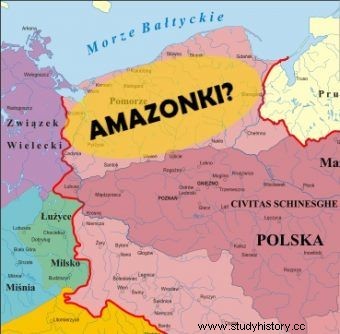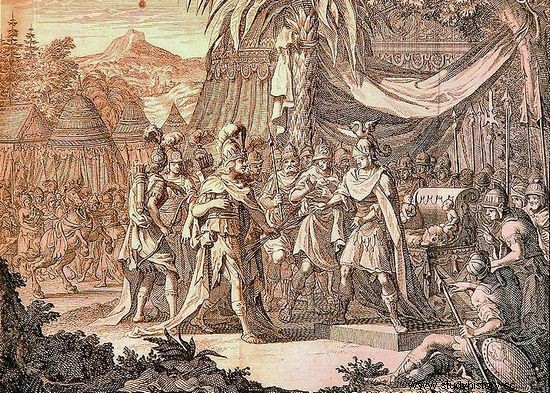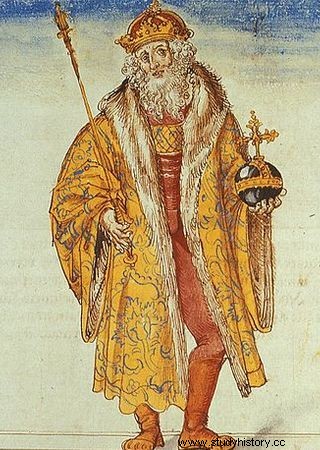You probably remember from your history lessons some Ibrahim Ibn Jakub - a Jewish traveler from Muslim Spain, who was the first to write something about the Polish state. The curious merchant told about the customs of the Slavs, about the brave warriors of Prince Mieszko, as well as about the peoples and countries with which contemporary Poland neighbored. Among the latter, he mentioned ... the mysterious City of Women.
Overall, the chronicle of Ibrahim - although only preserved in late medieval summaries - is considered to be one of the most valuable sources for the early history of Poland. Only thanks to it we know approximately what our borders looked like at the time when the state of Mieszko I emerged from the darkness of history.

With whom exactly did Poland border in the north? At least according to Ibrahim Ibn Jakub ... (map source:Poznaniak, license CC ASA 3.0)
Historians, however, have a problem with the account of the Jewish merchant, historian and traveler. Namely, he insisted that the country of Polans bordered from the north not with any Pomeranians, but with… Amazons! Textbooks prefer to omit this fragment so as not to confuse history in the minds of young adepts. However, we are not afraid of mixing. So what does the source say?
To the west of Burus [lies] the City of Women. It has lands and slaves, and they [i.e. women] get pregnant by their slaves. If [which] woman gives birth to a boy, she kills him. They ride horses and personally take part in the war, and they are distinguished by strength and ferocity. Ibrahim the son of Jacob the Israelite said:the news of this city [is] truth; Hótto, the Roman king, told me about it. To the west of this city [lives] a certain tribe belonging to the Slavs, called the Weltaba people .
Burus are undoubtedly Prussians, and Weltaba - Wolinians or Wieleci, living in the Odra basin and on the Połabie. So the City of Women should be placed somewhere near Gdańsk or Kołobrzeg ... In fact, it could be a whole country of women:the Arabic word madina it corresponds to both of these meanings. The source of the author's knowledge is the most interesting in the entire account. He swears that the German King (and later Emperor) Otto I had told him everything!

A 17th-century drawing of the Queen of the Amazons, Thalestris, visiting Alexander the Great. Could Mieszko I also count on similar honors?
Of course, it seems unlikely that the Amazons would actually be prowling Pomerania and that our first historical ruler would fight with them. Two explanations for the bizarre story come to mind. Maybe Otto I made a joke about an exotic traveler from far away, or maybe… at the German court, she was truly believed in. This would show how little was known in Christian Europe at that time about the lands east of the Oder.

Otto I (here already as emperor). This is what we eat thanks to the legend of the Pomeranian Amazons.
The biographer of Mieszko I, a historian from Poznań, Jerzy Strzelczyk, supported the second explanation. First, he stressed that:
Ibrahim's story is undoubtedly a reminiscence at this point widely in the ancient world and also among Muslims of the widespread myth of the Amazons, usually located where nothing was known for sure .
Secondly, he recalled that, both in Germany and beyond, it was widely believed that the city of the Amazons lies somewhere on the Baltic Sea. Most often he was found on some island, and even ... quite serious Polish historians picked up the topic. Only that instead of Pomerania, their eyes fell on Mazovia. Because it is enough to add one letter and we already have Amazon. Like nothing - country of the Amazons!
Source:
- Jerzy Strzelczyk, Mieszko I , Poznań 1992, pp. 40-43.
- Ibrahim ibn Jakub's testimony of his travels in Slavic countries .. ., pub. and trans. T. Kowalski [in:] Monumenta Poloniae Historica , nova series, vol. I, Kraków 1946, pp. 48-54.
